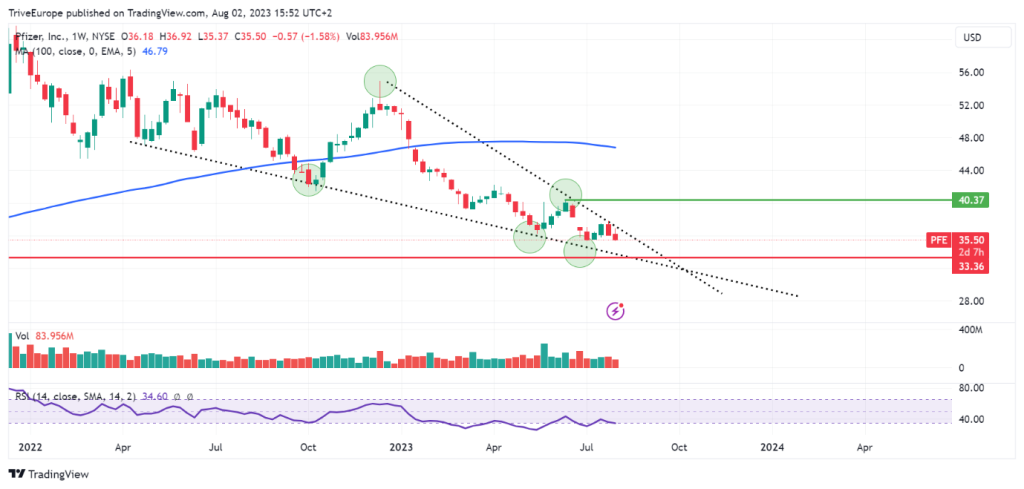Piece Written By Nkosilathi Dube, Trive Financial Market Analyst
In the ever-changing pharmaceutical industry landscape, Pfizer Inc.’s (ISIN: US7170811035) second-quarter 2023 performance has stirred intrigue among finance professionals. The company’s share price has endured a tough journey, plummeting by 30.50% year-to-date, largely due to waning demand for its once-coveted Covid-19 vaccine and antiviral drug treatment.
As the world transitions into a post-pandemic era, revenue and earnings have suffered a nosedive, reflecting a fading pandemic boom. With fewer vaccines administered, Pfizer faced an uphill battle in maintaining previous revenue levels, evident in the $12.73 billion second-quarter revenue, falling short of Wall Street’s $13.27 billion expectations.
Nevertheless, Pfizer exhibited commendable resilience, surpassing second-quarter earnings estimates at $0.67 per share compared to the projected $0.57 per share. Despite the challenging market sentiment, the drugmaker’s ability to outperform expectations offers a glimmer of hope.
However, the $1.6 billion in sales generated from Covid-19 products pales in comparison to the $17 billion achieved during the same period a year ago, underscoring the ongoing impact of weakened Covid-19-related product sales on Pfizer’s top line. What lies ahead for the giant drugmaker?
Technical
Pfizer Inc.’s share price performance is under the spotlight as a compelling technical pattern emerges. The falling wedge formation, characterised by a diminishing magnitude of price movements within the wedge channel, suggests a potential pause in the current downtrend as the share price hovers near a 29-month low.
Notably, support was firmly established in early 2021 at $33.36 per share, preceding a remarkable surge to an all-time high in the same year. Conversely, a recent swing high within the downtrend marked resistance at $40.37 per share, indicating a significant hurdle for any potential upside momentum.
Market sentiment is divided as Pfizer approaches a crucial juncture at the 29-month low. Given that the Relative Strength Index (RSI) points towards oversold conditions, it could signal an impending reversal. The prospect of a high volume breakout above the falling wedge pattern may indicate a buildup of upside momentum, attracting optimistic investors.
Conversely, if the downtrend persists, support at $33.36 per share may serve as a magnet for bargain hunters eager to scoop up the stock at a further discount. The $40.37 per share level will likely be earmarked as a point of interest to the upside by optimistic investors.

Fundamental
Finance professionals have closely scrutinised Pfizer Inc.’s second-quarter 2023 performance as the pharmaceutical giant grapples with the outgoing post-pandemic era. The sharp decline in COVID-19 infection rates and waning demand for vaccines substantially impacted the top and bottom lines.
Sales of Pfizer’s COVID-19 vaccine, Comirnaty, tumbled by 83% to $1.49 billion in the second quarter, while sales of its antiviral treatment, Paxlovid, plummeted 98% to $143 million. These declines were driven by low infection rates globally and impacted total revenue, which fell by 54% to $12.73 billion. Both the U.S. and International segments experienced significant sales declines, further contributing to the overall revenue contraction. International revenues declined by 59% to $6.55 billion, while U.S. revenues fell by 45% to $6.2 billion.
The bottom line also felt the strain, with Pfizer reporting a net income of $2.33 billion, or 41 cents per share, during the second quarter. This marked a significant drop from the $9.91 billion, or $1.73 per share, reported during the same period a year ago.
The strategic shift to keep the company afloat amid changing market dynamics became evident as Pfizer turned to mergers and acquisitions of promising healthcare businesses outside the COVID-19 field. Notably, the acquisition of Seagen is expected to bolster Pfizer’s cancer drug portfolio with the addition of antibody-drug treatment.
However, uncertainties remain as Pfizer braces for potential prolonged weakness in its COVID business. The company is actively considering cost-cutting measures, focusing on the COVID-related segment. Additionally, Pfizer, along with Moderna and Novavax, is preparing for the transition of COVID products to the commercial market, meaning they will directly sell vaccines and treatments to healthcare providers.
Looking ahead, Pfizer provided a trimmed topline forecast for the remainder of the year. The company revised the upper end of its 2023 revenue forecast down by $1 billion to $70 billion. This includes projected Comirnaty sales of approximately $13.5 billion, down 64% from 2022 levels, and Paxlovid sales of about $8 billion, down 58%. Excluding COVID-19 medicines, Pfizer anticipates operational revenue growth in 2023 to range from 6% to 8%, a reduction from the previous forecast of 7% to 9%.

Source: Trive Financial Services Malta – Koyfin, Nkosilathi Dube
Over the past decade, Pfizer’s share price growth of 85% pales in comparison to the S&P500’s impressive 171.50% gain, signalling the pharmaceutical giant’s struggle to keep pace with broader market performance. A once positive correlation with the S&P500 has turned negative, especially since the end of 2022, as weakness in Pfizer’s COVID-19 sales leaves investors questioning its prospects. The declining market sentiment indicates a challenging phase for Pfizer as it strives to regain investor confidence and navigate through uncertainties in the post-pandemic landscape.

Source: Trive Financial Services Malta – Koyfin, Nkosilathi Dube
Pfizer Inc has sustained operational profitability despite market challenges, delivering competitive returns among its notable peers. The company outperforms many rivals with an impressive EBIT Margin of 32.31%. Additionally, Pfizer’s ability to generate high returns per unit of sale, beyond its competitors, indicates a resilient financial position and promising growth potential. Investors may find comfort in Pfizer’s consistent profitability metrics amid market fluctuations.

Source: Trive Financial Services Malta – Koyfin, Nkosilathi Dube
Pfizer Inc has maintained a stable and healthy Return on Equity (ROE) of 31.62% over the past decade, outperforming most notable peers globally. This consistent performance reflects the company’s strong financial position, likely bolstering market sentiment and investor confidence in Pfizer’s profitability.
A fair value of $41.00 per share was derived after performing a discounted cash flow valuation.
Summary
Market sentiment toward Pfizer is mixed. The decline in COVID-19-related sales has posed challenges, prompting cautiousness among investors and traders. However, the company’s strategic efforts to diversify and strengthen its portfolio through acquisitions signal a potential path to recovery and future growth. If successful, the $41.00 per share fair value could materialise in the medium to long term.
Sources: Pfizer Inc, Reuters, CNBC, Moody’s, TradingView, Koyfin
This material is provided for informational purposes only and does not constitute financial, investment or other advice. No opinion contained in this material constitutes a recommendation by Trive Financial Services Malta Limited or its author as to any particular investment, transaction or investment strategy and should not be relied upon in making any investment decision. In particular, the information does not take into account the individual investment objectives or financial circumstances of the individual investor. Trive Financial Services Malta Limited shall not be liable for any loss, damage or injury arising from the use of this information.

